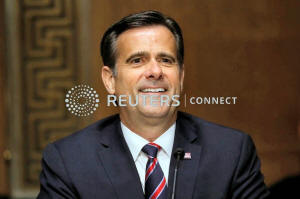|
Ratcliffe was confirmed by 49 to 44, with all "yes" votes coming
from Trump's fellow Republicans and all "no" votes from
Democrats. The last DNI, former Republican Senator Dan Coats,
was approved by 85-12, but ended up having an uneasy
relationship with Trump.
Ratcliffe has far less intelligence experience than any previous
director of National Intelligence, a post created 15 years ago
to run the country's 17 intelligence agencies in a more unified
way in the wake of the Sept. 11, 2001, attacks.
It was the second time Trump suggested Ratcliffe for the post.
He was the most junior member of the House Intelligence
Committee, with just six months on the panel, when Trump first
said he wanted to appoint him.
Republicans, some of whom had reservations about Ratcliffe's
qualifications for the job, highlighted the need for a
Senate-confirmed nominee for the national security post after it
was filled by interim directors for nine months.
Trump had named two acting directors, most recently Ambassador
to Germany Richard Grenell, another fierce Trump partisan who
has faced questions from Democrats about reorganizing his office
and efforts to declassify records.
"In a time when the threats to our nation are many and varied,
it is critical to have a Senate-confirmed DNI," said Republican
Senator Marco Rubio, acting chairman of the intelligence
committee.
Trump has often clashed with the findings of intelligence
agencies. He dismissed as a Democratic hoax their conclusion
that Russia meddled in the 2016 election to help Trump. When he
first chose Ratcliffe to be DNI, he said the intelligence
agencies had "run amok" and he hoped he would rein them in.
During his confirmation hearing, Ratcliffe was pressed by
senators, both Republicans and Democrats, on whether he would
act independently of the president. Ratcliffe said: "The
intelligence I deliver will not be subject to outside
influence."
Senator Ron Wyden, a senior member of the Intelligence
Committee, said Ratcliffe would be a threat to democracy. "There
is every reason to believe that his public statements would be
designed for one purpose, and one purpose only – to please
Donald Trump," he said before Thursday's vote.
Ratcliffe assumes the position as the country faces a wide range
of security threats, including the coronavirus pandemic, stiff
competition with China and the widespread expectation that
Russia is attempting to interfere in the 2020 U.S. election.
Trump first announced in July that he wanted Ratcliffe for the
post.
However, Ratcliffe's name was withdrawn after just five days
when both Democrats and Republicans questioned his
qualifications and amid reports he had padded his resume by
overstating his role in prosecuting terrorists while serving as
a U.S. attorney in Texas.
But Trump nominated him again this year after Ratcliffe's
aggressive work defending the president when the House of
Representatives impeached him last year.
(This story has been refiled to add dropped word in headline)
(Reporting by Patricia Zengerle; Editing by Mary Milliken and
Dan Grebler)
[© 2020 Thomson Reuters. All rights
reserved.] Copyright 2020 Reuters. All rights reserved. This material may not be published,
broadcast, rewritten or redistributed.
Thompson Reuters is solely responsible for this content.

|
|






